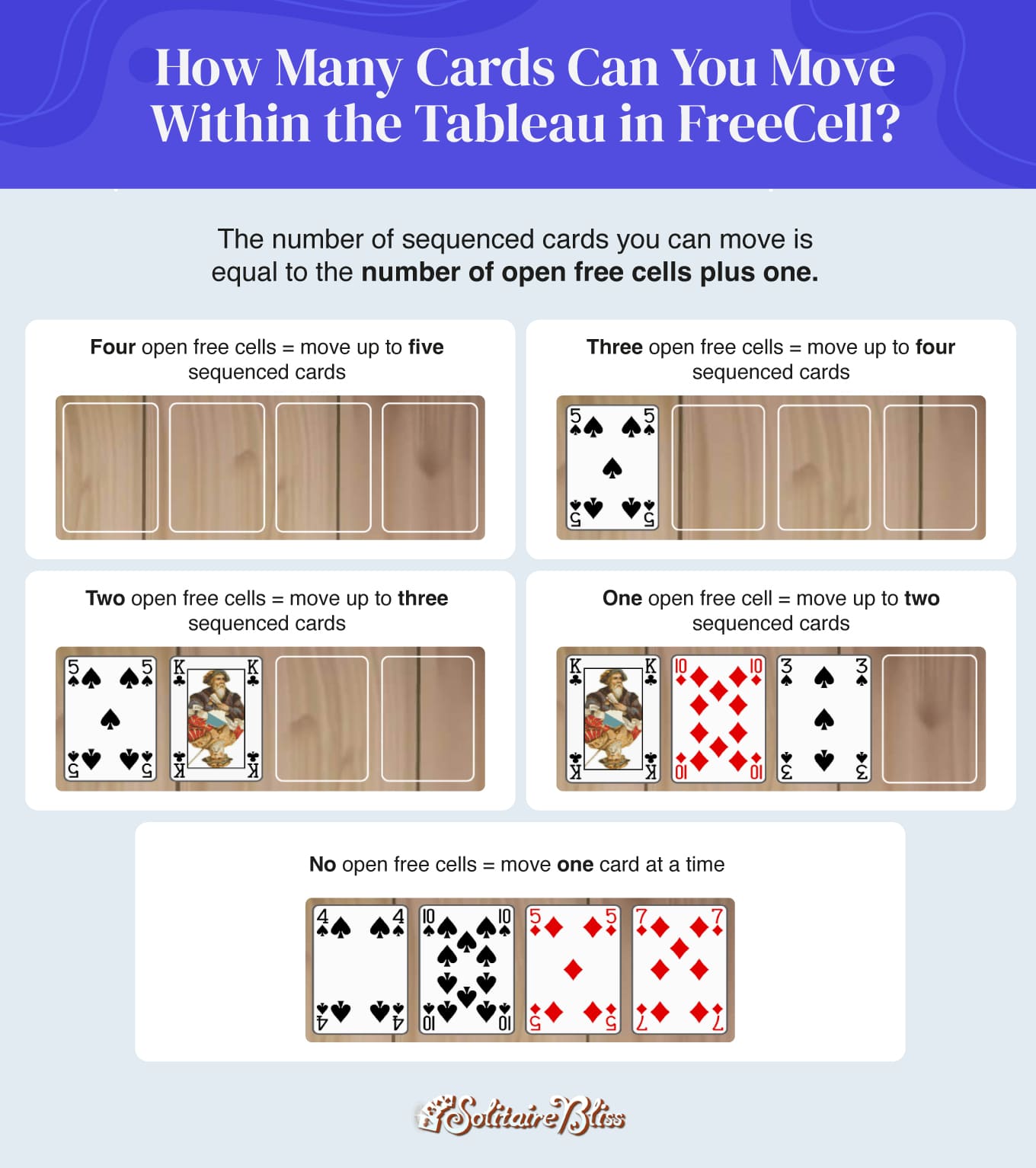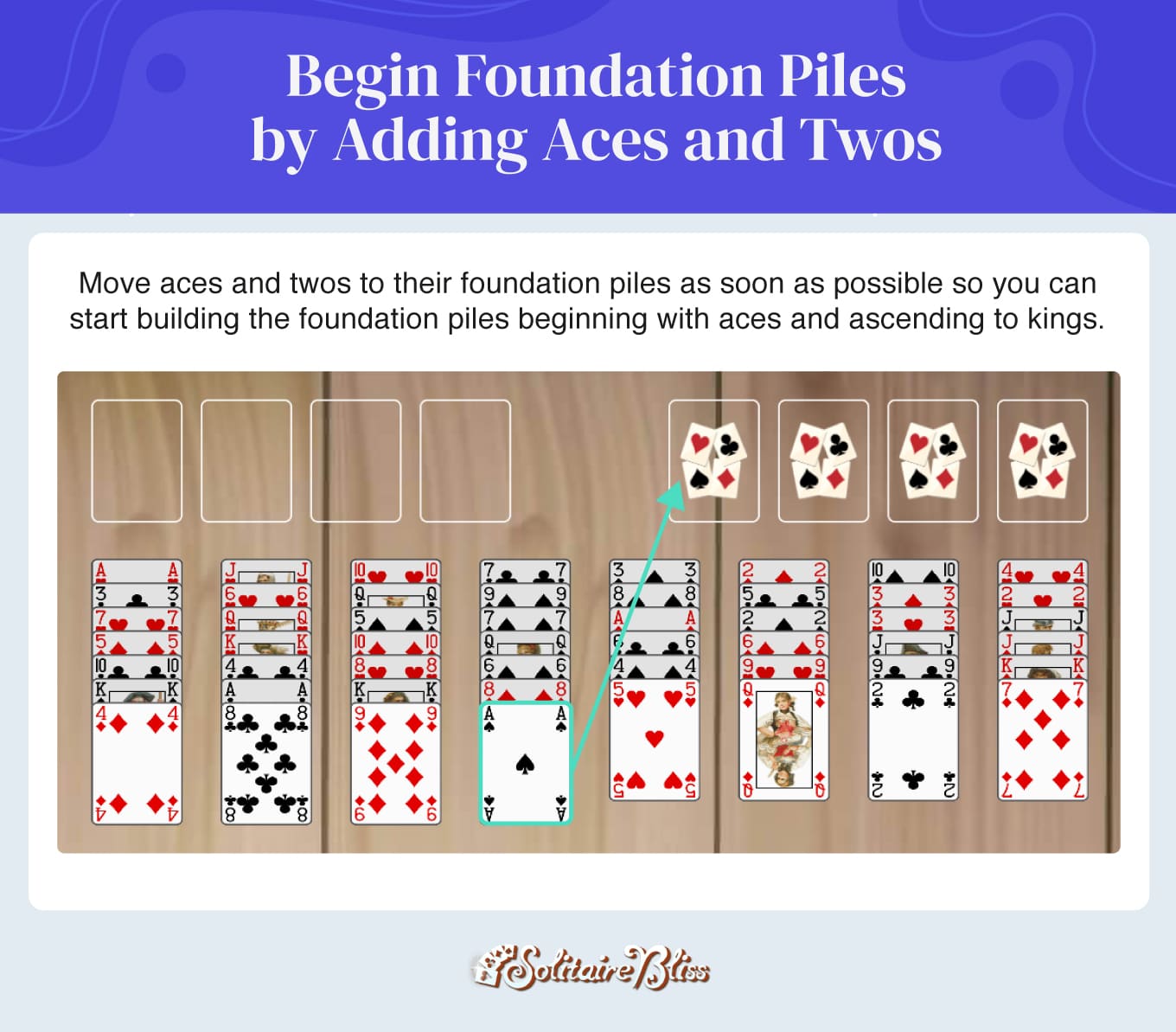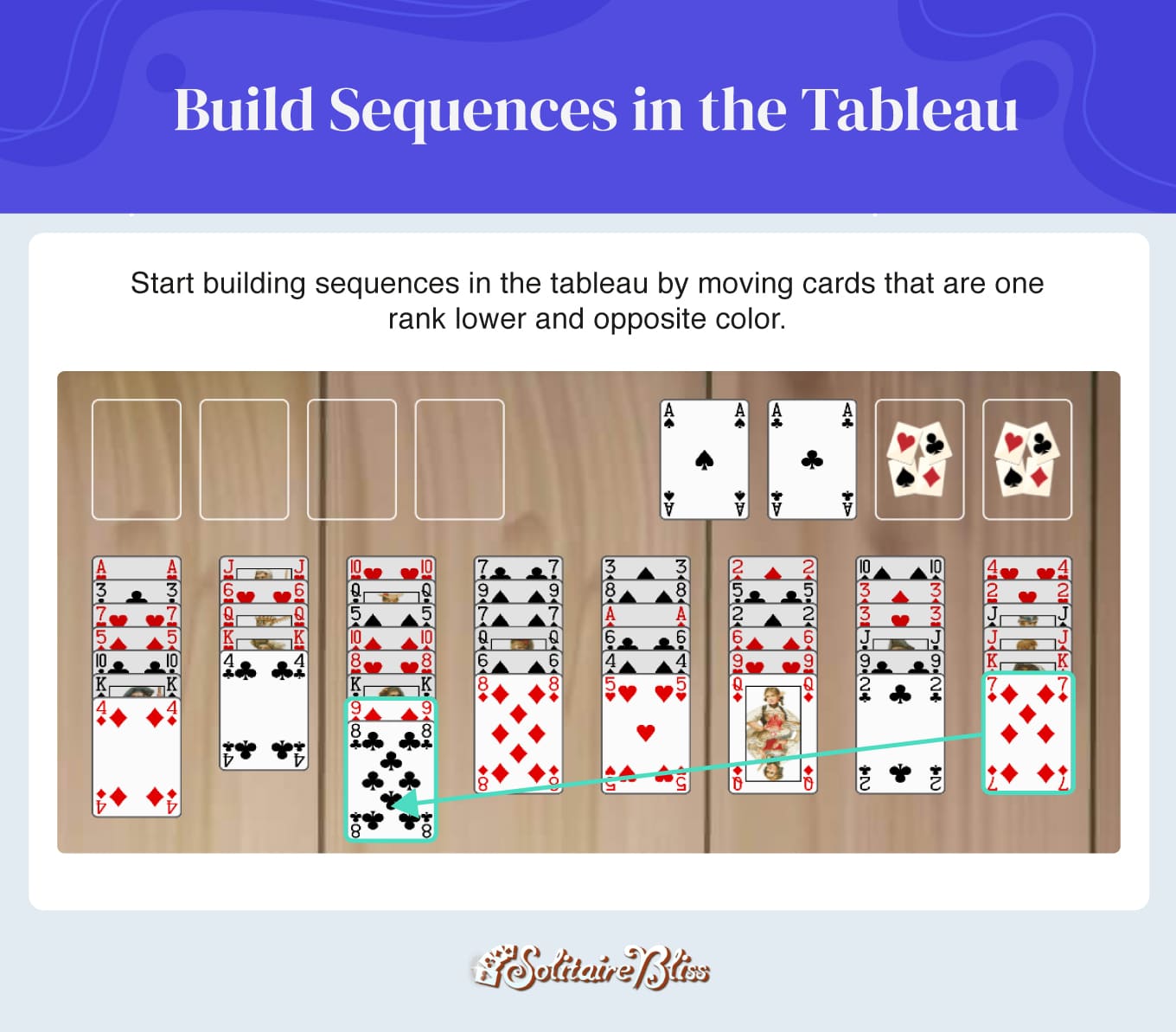How to Play FreeCell Solitaire: Rules & Tips to Win
FreeCell Solitaire isn’t that different from Klondike Solitaire. With all cards face up and four free cells available for moves, it's regarded as one of the easiest Solitaire games. To win, you must move cards from the tableau to one of the four foundation piles, arranging them by suit from ace to king. You can play FreeCell online for free at Solitaire Bliss.
In this post, we show you how to play FreeCell Solitaire, give you strategies on how to win, and introduce you to similar Freecell games.
If you know how to play already, you may be more interested in learning about FreeCell strategies.
Quickplay FreeCell Solitaire Rules
The first step to playing FreeCell is understanding these basic rules:
- Build four foundation piles by suit, starting with ace and ending with king. After each foundation pile has been completed and the tableau is clear, you've won the game.
- You can move exposed cards on the tableau, sequencing them in descending rank and opposite color. You can also move sequences around to free up the cards underneath them.
- The number of free cells available dictates how many cards you can move at a time. The number of sequenced cards you can move is equal to the number of open free cells plus one.
- You can move any cards to the free cells. You can only move a single card, not a sequence, to free cells. This will help you free cards that could be moved to the foundation piles or used to create sequences.
- You can move any card to an empty column on the tableau. Regardless of rank or suit, you can move any card or sequence, if you have enough free cells to do so, to fill an empty column. Although you can move any card, moving a higher rank card into this position allows you to build longer sequences down from it.

How to Play FreeCell Solitaire
If you need more guidance, this step-by-step tutorial helps you understand the ins and outs of the game.
1. Understand the Game Set Up
- Tableau: Deal a deck of cards into eight columns with all cards face up. Place seven cards in the first four columns and six in the last four.
- Foundation piles: Leave space for four foundation piles in the top-right corner to sequence cards from ace to king. There is one foundation pile for each suit.
- Free cells: Leave space in the top-left corner for the four free cells. You can move exposed cards to free cells to help organize the tableau or free up cards for foundation piles. The number of free cells dictates how long of a sequence you can move.
- Four open free cells = player can move five sequenced cards at a time
- Three open free cells = player can move four sequenced cards at a time
- Two open free cells = player can move three sequenced cards at a time
- One open free cell = player can move two sequenced cards at a time
- No open free cells = player can move one card at a time
2. Begin Foundation Piles by Adding Aces and Twos
Now that you've familiarized yourself with how FreeCell is set up, you'll want to strategize your first moves. First, identify where all the aces and twos are in the tableau. If there are any exposed, move them to their respective foundation piles immediately. If not, determine how to free them using the free cells and building sequences. Moving aces and twos to the foundation piles early in the game allows you to work toward your goal of clearing the tableau by building complete foundation piles from ace to king.

3. Build Sequences in the Tableau
If you don't have any exposed aces or twos or if you have moved them all to the foundation pile, it's time
to build sequences. This requires you to move cards that are one rank lower and the opposite color of the
card you want to build a sequence on. For example, if a red seven is covering a column that has one of your
aces in it, you can move the red seven to a black eight and get one step closer to that ace.

4. Move Cards to Free Cells to Continue Play
You can use the free cells to move cards off the tableau individually, helping you to unblock the cards you need. For example, if a queen is covering a two that you can play on a foundation pile, you can move the queen to the free cell so you can move the two off the tableau and onto its foundation pile.
However, remember that free cells dictate how long of a sequence you can move within the tableau. Filling them up limits the moves you can make within the tableau. If you don't have any free cells available, you can only move one card at a time within the tableau.
5. Fill Empty Columns with a Card or Sequence of Cards
If you have an empty column, you can put a card or sequences of cards there, allowing you to free up more cards on the tableau. Your best bet is to move a high-ranking card into the empty column since you can create a longer sequence from it. For example, with a queen, you'll be able to sequence many more cards than you would a four.
When it comes to sequences, you'll only be able to move a sequence there if you have the right amount of free cells available. So if you have a queen of hearts, jack of spades, and ten of diamonds in the tableau and at least two free cells available, you can move that sequence to an empty column and still have room to build more onto the sequence.
6. Complete the Foundation Piles to Win the Game
Once you've cleared the tableau and put all the cards into the four foundation piles, you've won the game. If you run out of moves, you lose. If you're stuck during gameplay, use the hint and undo buttons to see if you have any available moves left.
FreeCell Solitaire Strategies
Knowing FreeCell rules is great, but it takes strategy to win. If you find yourself getting stuck, practice these strategies to see if they help your gameplay.
Move Aces and Twos to the Foundation Piles As Soon As Possible
Moving aces and twos to the foundation piles should be your top priority when starting the game. You can even do this with threes or fours, since they don't need to be in a complete sequence for you to move them to their foundation piles. With FreeCell Solitaire, you can move an individual card onto the foundation pile as soon as it's available.
Avoid Building Sequences That Block Cards
You'll need to build sequences, but you don't want to build long sequences that block necessary cards behind them. In these cases, keep sequences shorter with two, three, or four cards so you can move them between columns. If you have the ace of clubs in a foundation pile, but the two is buried in a column, building long sequences at the bottom of that column blocks you from making moves to the foundation pile for clubs. However, when building a sequence in an empty column, you can make those longer so you can get more cards onto the sequence.
Maintain Empty Columns and Free Cells
Use your free cells strategically and only when you get stuck. By keeping some empty free cells, you can continue to move more cards throughout the tableau. You should also save your empty tableau columns for higher-rank cards so that you can build longer sequences from them.
Build Foundation Piles Evenly
Build your foundation piles evenly, as you might need lower-ranking cards to help make more moves. Because you have to alternate colors for sequences and build them in descending order, increasing one foundation pile more than the others can decrease the chance of using cards you might need by half.
For example, if all of your foundation piles have begun, but you built the spades up to the rank of seven and the others to only three, you've locked away black cards you might have to access. If you need to move a sequence beginning with a red five onto a black six, you have only one card you can count on the six of clubs because the six of spades is hidden in its foundation pile. So keep foundation piles within two ranks of each other to avoid this from happening.
Strategically Split Up Sequences Using Columns or Free Cells
When you can't move long sequences due to a lack of free cells, break it up to see if that helps you move the entire sequence.
If you have a sequence of queen, jack, ten, and nine and another sequence of eight, seven, six, five, and four in another column, you need all four free cells open to place the sequence on top of the nine. If you just have three open, see if there is a king or empty column you can move the queen sequence to. Then move the four through seven into the free cells, move the eight on the nine, and then move the seven through four back to the sequence.
Use the Undo Button
Don't hesitate to use the undo button. This helps you if you're stuck or if you see another move you could've made. This can also help you avoid losing the game and help you practice different strategies.
Similar Games to FreeCell Solitaire
If you enjoy playing FreeCell Solitaire, you may also enjoy these card games.
- Baker's Game: Set up in a similar way as FreeCell, you can only move as many cards as you have in free cells, minus one. In normal FreeCell, you can move as many cards as you want as long as they equal the amount of free cells plus one.
- Easy FreeCell: Nearly 100% of these are solvable. You set up the game just like regular FreeCell, except you'll already be given aces and twos in the foundation piles.
- Eight Off: In this version, you will be given eight free cells. Four are already filled, while four are empty. Like Baker's Game, you can only move as many cards as you have in free cells, minus one.
- Pyramid Solitaire: In this game, the cards are dealt in a pyramid shape. To move the cards to the foundation pile, you must pair unblocked cards on the tableau with each other or with a card from the waste pile so that their combined rank is 13.
- Tripeaks: The goal is to move cards to the foundation pile if its rank is one higher or lower than the top foundation card.
Play FreeCell Solitaire for Free Online!
Now that you know how to play FreeCell Solitaire and have some strategies in your toolbox to use, you can play for free online at Solitaire Bliss. You can play as a guest or create a free account and log in with your email to compete with friends and save your score. By practicing FreeCell Solitaire and utilizing different strategies, you can become a pro in no time.
Play FreecellBack to the Homepage

